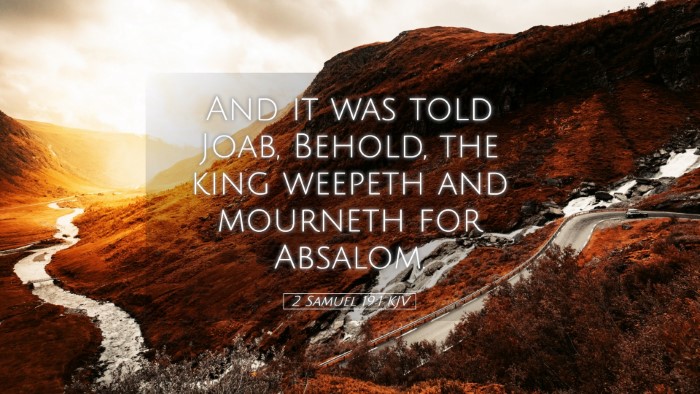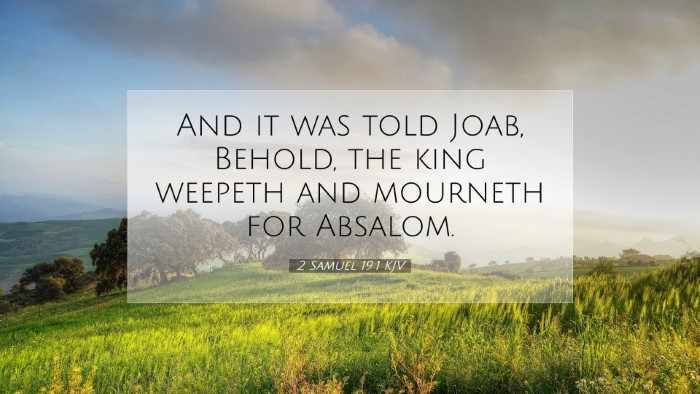Commentary on 2 Samuel 19:1
“And it was told Joab, Behold, the king weepeth and mourneth for Absalom.”
Contextual Background
The narrative of 2 Samuel 19 follows the tumultuous events surrounding King David's son Absalom, who rebelled against his father and sought to usurp the throne. Absalom’s death at the hands of Joab brought a significant emotional crisis for David. The verse reflects David's profound sorrow and sets the tone for the complexities of leadership, loyalty, and familial ties.
The Impact of Absalom's Death
This verse serves as a poignant moment in the account, revealing David's deep paternal love for Absalom despite the latter's rebellion. It illustrates the pain of a father mourning for his son, a theme that resonates deeply within the human experience.
-
Matthew Henry notes that David’s reaction indicates the weight of tragedy and the depth of a father's affection, suggesting that familial bonds are often fraught with complexity and conflict.
-
Albert Barnes emphasizes the profound sorrow that enveloped David, interpreting it as a reflection of unresolved tensions between duty and love. David mourned not only for the loss of Absalom but also for what his son could have been.
-
Adam Clarke points out that David's mourning was public and intense, showing that leaders are often caught between their roles and their personal attachments, which can create a challenging dichotomy.
Leadership and Emotional Turmoil
David’s grief reveals the personal struggles faced by leaders. He is depicted here as a father in profound pain, which contrasts sharply with his role as king and warrior. Joab's reaction to the situation further complicates the dynamics at play.
-
Matthew Henry asserts that a king’s personal grief must sometimes be tempered for the sake of public order. David's sorrow might have undermined the morale of his supporters, emphasizing the often harsh realities of leadership.
-
Albert Barnes cautions that while mourning is a natural human emotion, leaders must carefully balance their personal feelings with their responsibilities to their people.
-
Adam Clarke suggests that Joab's intervention and David's public mourning encapsulate the struggle of maintaining authority in the face of personal loss, highlighting the challenges leaders frequently encounter.
Theology of Mourning
The reaction of King David invites theological reflection on the nature of grief. It portrays an authentic response to loss, teaching that mourning is a significant part of the human experience and can be an expression of love and connection.
-
Matthew Henry suggests that mourning can serve as a reminder of our human frailty and the impact of sin, reflected in Absalom's tragic rebellion.
-
Albert Barnes remarks that grief can indeed be a double-edged sword, wherein individuals may experience both personal loss and the repercussions of the actions that led to that loss.
-
Adam Clarke adds that understanding the nature of one's mourning can lead to deeper insights about forgiveness, the effects of pride and rebellion, and the hopes of reconciliation.
Applicability for Today's Pastors and Leaders
This account serves as a valuable lesson for today's leaders, especially those in pastoral roles. It highlights the importance of addressing personal grief while also fulfilling public duties.
-
Matthew Henry would urge pastors to recognize the necessity for pastoral care towards themselves in times of loss, emphasizing the principle of self-care in ministry.
-
Albert Barnes encourages leaders to be mindful of how their personal emotions can affect their congregations and communities, advocating for a balance between transparency and leadership authority.
-
Adam Clarke calls for sensitivity towards those in mourning and suggests that leaders should cultivate a culture of compassion and understanding within their communities.
Conclusion
2 Samuel 19:1 stands as a powerful reminder of the human experience of grief and the challenges faced by those in positions of authority. The insights drawn from Matthew Henry, Albert Barnes, and Adam Clarke provide profound understandings for pastors, students, theologians, and Bible scholars alike. It invites reflection on the delicate interplay between personal pain and public responsibility, urging leaders to navigate their emotions with grace and sensitivity, while also allowing for the human experience of mourning in both their lives and their ministries.


